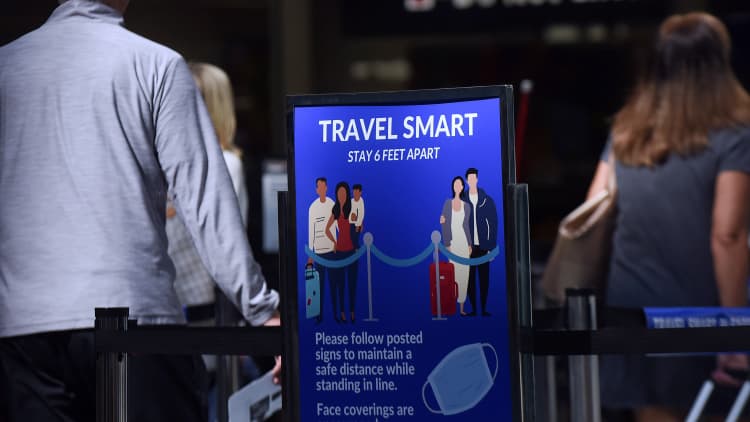A View from the Top is a Q&A series exclusively available on CNBC Pro. CNBC reporters regularly speak to business leaders about decision-making, investing and industry news.
The Covid-19 pandemic hasn't been easy on any airline, but Allegiant Travel is having a moment. The parent of discount airline Allegiant Air won over analysts earlier this month, posting nearly $46 million in earnings before costs in the fourth quarter, despite a $184 million annual net loss. The company expressed optimism about future bookings, while keeping a lid on expenses.
The Las Vegas-based airline is well equipped to handle the turmoil, analysts say: The airline is lean, focused on U.S. domestic travel with nonstop routes to beach and other outdoor destinations from midsize cities that have remained relatively buoyant in the pandemic.
Its big network competitors that were heavily reliant on international and business travel before the virus spread have suffered deeper losses.
"We expect Allegiant's financial outperformance to continue into 2021 driven by a better cost outlook, a modest CAPEX program, and supported by a robust liquidity position," Deutsche Bank said in a Feb. 4 note, raising its 12-month stock price target to $250 from $180.
"While we have built in a revenue recovery for the year, it is a modest one, at best," the note continued. "As such, we are raising our earnings forecasts for Allegiant, which makes the stock unique among our sector: it is the only name in our coverage universe with higher estimates following its Dec Q earnings call."
Deutsche Bank expects full-year earnings from Allegiant of $5.50, up from a previous estimate of $4 a share.
Allegiant's shares are up nearly 30% and more than most other publicly traded U.S. passenger airlines.
Vaccines are now on the way and better demand for travel is on the horizon. Allegiant last week unveiled 34 new routes, including Austin, Texas, to Bozeman, Montana, and St. Cloud, Minnesota, to Destin, Florida.
CFO Greg Anderson spoke with CNBC about how the airline is gearing up for a rebound in travel:
Here's the Q&A:
(This interview has been lightly edited for length and clarity.)
You know how 2020 went. How are you approaching this year? Are you in expansion mode solely?
If we could use one word to describe it would be flexibility. There have been some leading indicators that suggest that in the mid-to-back half of '21, there's some pent-up leisure demand that we should be able to support and fly.
Some of that is the vaccinations and the timing of that. We track by region: mobility index, Google searches that are starting to suggest that people are looking for bookings in peak travel periods for leisure. We also do customer surveys and just under 70% of our customers consistently say a couple of things: they view the situation of Covid getting better or much better and they plan to get out and fly within six months.
How do you choose destinations?
I would characterize it as four major pillars we look at: One is just underserved leisure markets. Looking at every market, who is flying that market, what the population looks like and what kind of leisure draw is in that market. Another is the population sprawl. What we're seeing in this work-from-anywhere environment where people are going or want to go. Google searches is helpful data. Another is filling the voids of some of the larger carriers. As you seeing retrenching or pulling back direct flights from certain areas, that's an indicator for us to take a look to see if that makes sense for Allegiant to backfill that with a direct nonstop flight. And another is just hyperseasonal routes. For a week or two throughout the year, there's going to be a lot of demand, so looking at it for that perspective.
We built our model to fly when it makes sense to fly and to park when there isn't that demand. For example on Tuesdays in Vegas we don't fly because there's no leisure demand for that. But Thursdays and Fridays or Sundays and Mondays we'll ramp up and start flying a lot. In September, we really park our fleet and don't fly as much. The whole airline is built on that. I think what's really helpful in understanding the dynamics is we see pockets of demand at certain periods of time and we deploy our assets during those periods of time, and when there's not, we'll park. That's why the routes you'll see are two times a week, three times a week.
When we think about Covid, it was just an intensified version of our model. You're flexing up in capacity when you find pockets of demand.
Since so many Americans postponed vacations during the pandemic, do you expect summer vacation season to be longer this year?
We were pleasantly surprised by September [2020] demand. We can definitely see that again in 2021. If we start seeing September could be a more-than-normal flying month, we'll be able to capture that demand pretty quickly.
When is peak season for you?
In historical terms, March has been our peak and mid-June through August.
Are there any airports that are normally busy that you've seen an opportunity to get into?
We're not too focused on that. A lot of airports out there that have come to us that are wanting us to grow into their airports as well particularly because we're one of the few carriers that are talking about growth. We're able to get into all the airports that we've been planning to.
Boston, or [Chicago] Midway, we probably could have gotten in there but it's [a] greater [opportunity] today than it was a year ago.
What are your expectations for spring break?
It's not going to be as good as we would have seen in 2019 but relative to last year or different periods in 2020 it'll be considered a peak period and we'll do fine. I wouldn't be surprised if in 2022 it's closer to normal.
You're still burning cash?
Daily bookings of close to $3.5 million a day is breakeven for the first quarter, but ... $4 million a day, you'll be close to breakeven on your debt and your capex.
Our data suggests we should see improvements. I think there is a likely scenario that we'll be EPS positive in 2021.
How has airline customer behavior changed in the pandemic?
It's pretty interesting what we saw during 2020. One we could probably call a reverse flow, meaning from some of the bigger cities such as Las Vegas you were seeing originating traffic from Las Vegas, which is typically a destination city for us, going north to more of the open, wide outdoors: Montana, Idaho, to Northern California, which we taglined that "nonstop to nature."
We also saw some positive signs on work, stay, play. The remote working atmosphere. In Las Vegas, for example [we] market to customers that could come to Vegas and spend a lot of time [there] ... partner with hoteliers to say you can work here, play here. Things like that were unique.
Also, close-in bookings. Pre-pandemic, our booking curve would average maybe 40-45 days. During the pandemic, in the midst of it, you were seven-10 days [ahead of the flight], and we're still just under 20 days so it's still a relatively close-in booking curve. So what we tried to do for our customers is we provided a lot of flexibility so they could change their flights for free.
Do you expect the trend of last-minute bookings to last?
I think there still will be, especially with the fluidity of the situation with Covid. As more time passes and more vaccinations, you'll naturally get back to that elongated booking curve.
Do you know everywhere you're going to fly in 2021?
I think for the most part. The announcement will be a good indicator. As things evolve and pop up certainly I would think we would deploy capacity if the demand environment warrants that. The takeaway, largely, we have a good idea and that's already out for sale but it doesn't mean throughout the year that we may not add more or pivot here and there to make sure it's right-sized to whatever the demand environment is.
Do you have any plans to grow the fleet?
We ended '20 with 95 aircraft and we expect right now to be at the end of 2021 108 aircraft. We are growing our fleet but I just want to highlight that we do have 20 aircraft that we've identified that if demand environment doesn't come back quite like we're thinking or expecting in the second half of 2021 and beyond, we have a safety valve that we can retire aircraft and right-size to whatever that might be. I mention that because some of the other [ultra-low cost carriers], your Spirits and your Frontiers, they have aircraft orders where they're going to have to take those aircraft. We don't have any major aircraft order out there. They're used [Airbus] A320s.
Are there a lot of aircraft bargains out there?
I would say from pre-Covid the aircraft we focus on, the Airbus A320ceo, is roughly 25%-30% under, post-Covid. There's a lot of interest from others to work with Allegiant. Inundated may be a strong word but we get a lot of inbounds from folks that own those assets.
Competitor Sun Country Airlines has teamed up with Amazon to fly cargo. Does that side business interest you?
We think that the more low-hanging fruit ... for us on the scheduled service side. I think that's what we'll continue to focus on. Never say never but [cargo's] not a strategic objective for us. Charter has always been a nice complementary business for Allegiant. A good example, certain days of the week, when we're not utilizing our aircraft, we can deploy those assets for charter.
Are you planning to grow the staff?
Just as the [payroll support protection] rolled off in October we ended up furloughing about 130 pilots, but since the announcement of PSP2, we announced we would be recalling all of those pilots and regardless of what happens we do not intend to furlough pilots post-the restrictions on PSP2 (on March 31). In fact, we're trying to position ourselves to hire pilots in the back half of 2021 for 2022. And we're out hiring flight attendants to support our potential growth that we want to do in 2021 and beyond.
Some airlines are backing a third round of government aid, which a House committee advanced last week. Do you support that?
We're definitely appreciative of all the support the government has provided. It has been a real game changer. I think for us at Allegiant, we don't need it. We'll be fine without it. For a lot of the carriers, this is going to be helpful for them to keep jobs. This pandemic wasn't anyone's fault. It wasn't the airlines' fault. I don't think they mismanaged things. We're super grateful for everything we've received to date and we don't necessarily think we need it going forward but we'll be appreciative if that ends up happening.
So if they end up passing it, you'd apply?
I think so, it would probably make sense for us to do so particularly with all the other airlines.






